Peanut butter may help support heart health, muscle strength, and weight management when consumed in moderation.
It’s a nutrient-dense, plant-based protein source packed with healthy fats, vitamins, minerals, and antioxidants. Understanding its nutritional value and science-backed benefits can help you include it safely in a balanced diet for overall wellness.
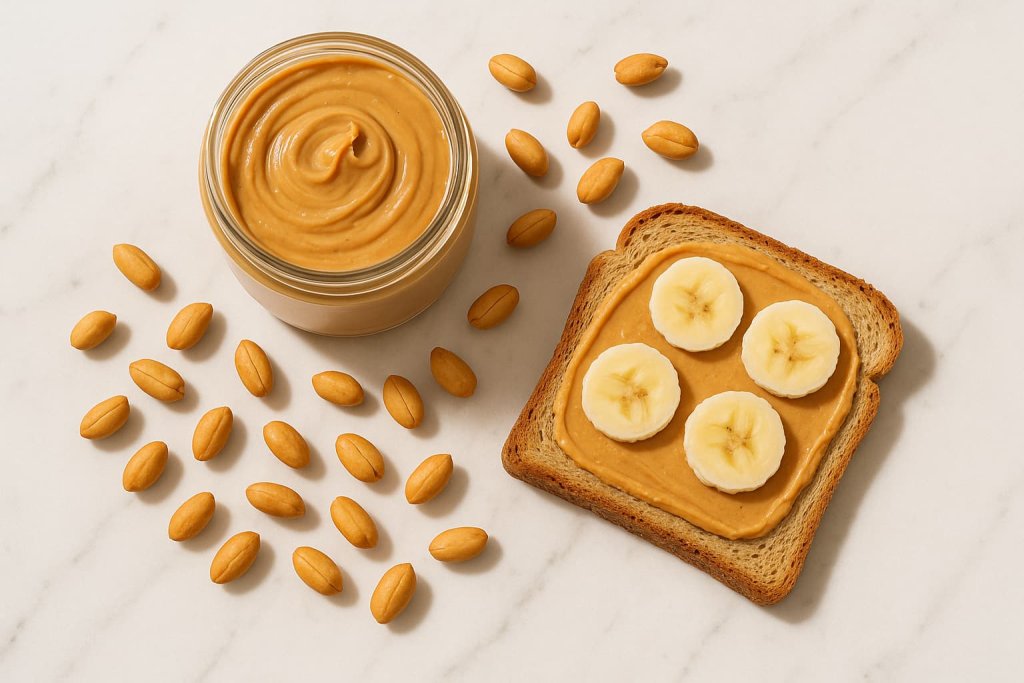
What Is Peanut Butter?
Peanut butter is a nutrient-dense spread made by grinding roasted peanuts into a thick, creamy or crunchy paste. It’s a versatile food used worldwide in breakfasts, snacks, smoothies, and baked goods.
The base ingredient — peanuts — is naturally rich in healthy fats, plant-based protein, and essential micronutrients such as magnesium, niacin, vitamin E, and phosphorus. Most peanut butters contain around 90–95% peanuts, but the nutritional quality varies significantly based on added ingredients.
Types of Peanut Butter:
- Natural Peanut Butter: Made with just peanuts (and sometimes a small amount of salt). It may separate naturally, with oil rising to the top — a sign of minimal processing.
- Creamy Peanut Butter: Smooth in texture, often blended with stabilizers to prevent oil separation.
- Crunchy Peanut Butter: Contains small peanut pieces for texture and higher fiber content.
- Unsweetened Peanut Butter: Contains no added sugars or artificial sweeteners, making it a healthier choice for blood sugar control.
Why Natural Peanut Butter Matters:
Choosing natural or unsweetened peanut butter is essential for maintaining the nutritional integrity of the product. Commercially processed varieties often include added sugars, hydrogenated oils, or excess sodium, which may reduce heart-health benefits.
The Harvard T.H. Chan School of Public Health recommends selecting nut butters with minimal ingredients — ideally “peanuts and salt only” — to maximize the benefits of unsaturated fats and protein while avoiding trans fats.
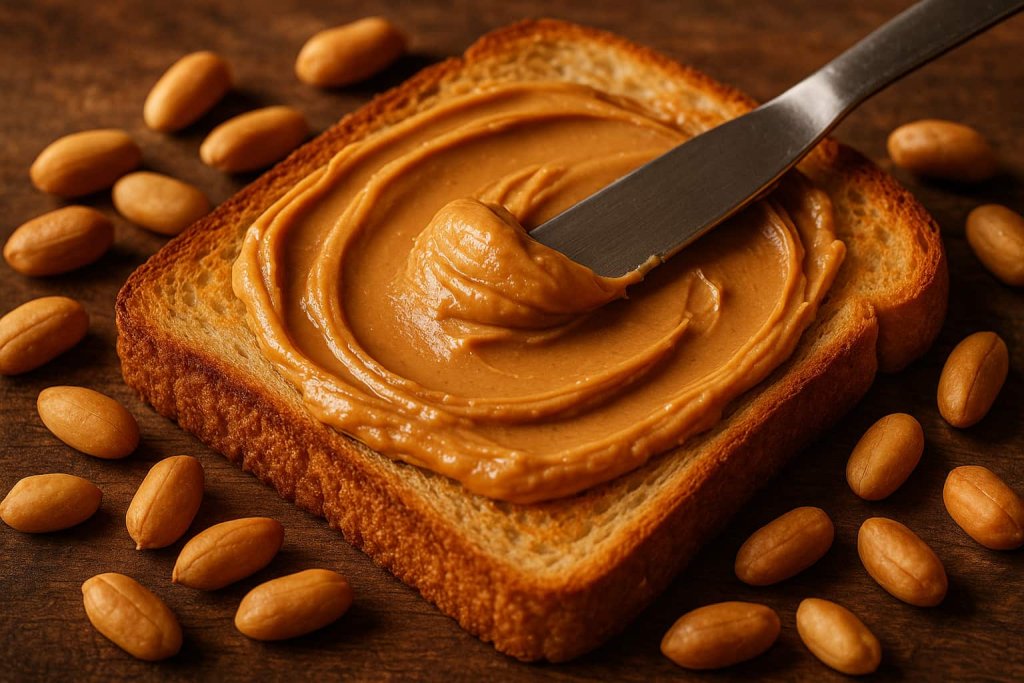
Nutritional Profile of Peanut Butter
Peanut butter is a nutrient-dense food that offers a balanced mix of macronutrients and essential micronutrients — supporting energy, muscle function, and metabolic health. A standard 2-tablespoon (32 g) serving delivers concentrated nutrition in a small portion, making it a popular choice for both plant-based and active lifestyles.
Peanut Butter Nutrition Facts (per 32 g serving)
| Nutrient | Amount | % Daily Value (Approx.) |
|---|---|---|
| Calories | 190 kcal | — |
| Protein | 8 g | 16% |
| Total Fat | 16 g | 20% |
| Saturated Fat | 3 g | 15% |
| Carbohydrates | 7 g | 2% |
| Fiber | 3 g | 12% |
| Magnesium | 57 mg | 14% |
| Vitamin E | 2.9 mg | 19% |
| Niacin (B3) | 4.2 mg | 26% |
| Phosphorus | 107 mg | 15% |
| Potassium | 208 mg | 6% |
(Source: U.S. Department of Agriculture – FoodData Central, 2024)
Key Nutrient Benefits
- Protein: Helps build and repair muscles, supports enzyme activity, and contributes to immune function.
- Healthy Fats: Primarily monounsaturated and polyunsaturated fats, which may help maintain healthy cholesterol levels and support cardiovascular and brain function.
- Fiber: Aids digestion, promotes satiety, and may support healthy weight control when included in balanced meals.
- Magnesium & Phosphorus: Contribute to bone strength, energy metabolism, and muscle recovery — key for active individuals.
- Vitamin E: Acts as a powerful antioxidant, protecting cells from oxidative stress and supporting immune health.
- Niacin (Vitamin B3): Essential for converting food into energy and maintaining healthy nervous system function.
10 Proven Health Benefits of Peanut Butter (Backed by Science)
Peanut butter is more than just a popular spread — it’s a nutrient-dense food rich in healthy fats, protein, and essential micronutrients. Scientific studies show that moderate peanut butter consumption may support heart health, muscle strength, energy balance, and overall wellness.
1. Supports Heart Health
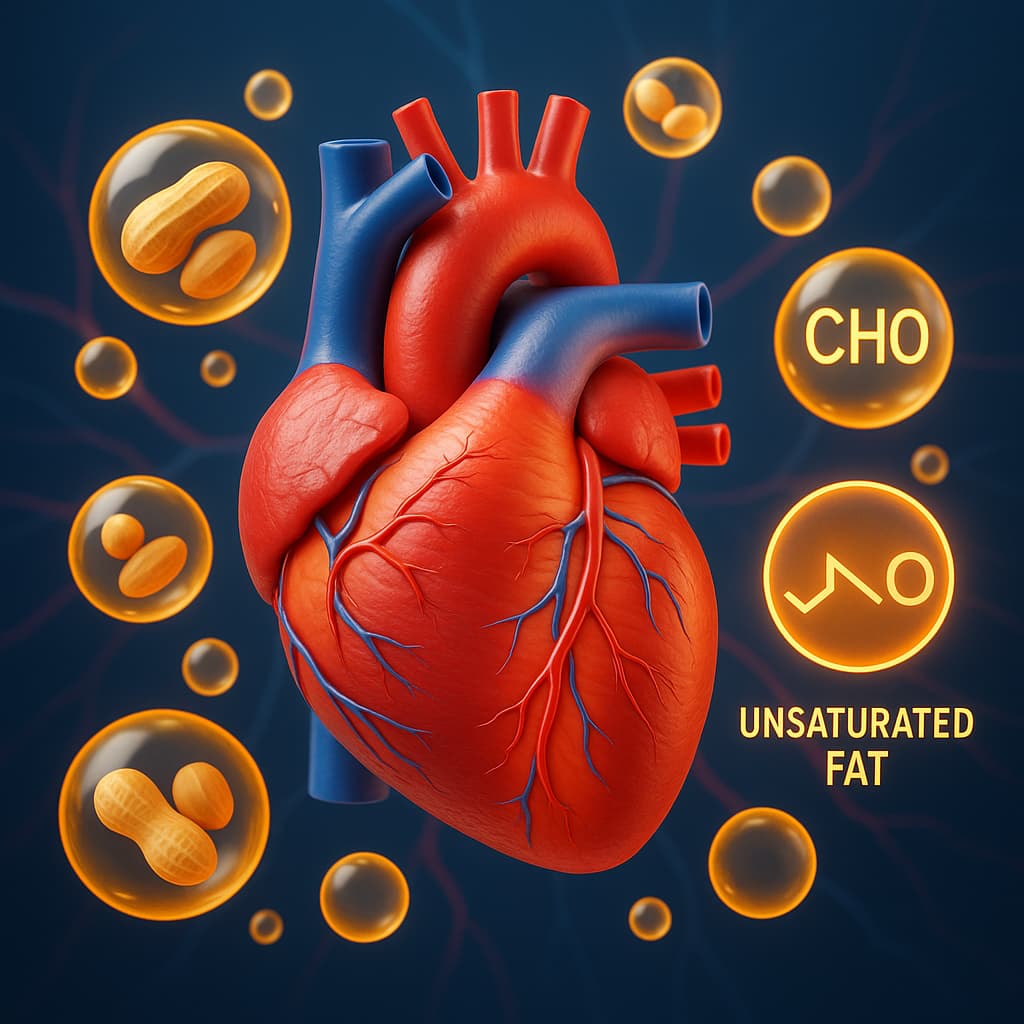
Peanut butter is rich in monounsaturated and polyunsaturated fats, the same heart-healthy fats found in olive oil and avocados. These unsaturated fats may help maintain healthy cholesterol levels, reducing LDL (“bad”) cholesterol and supporting overall cardiovascular function.
According to the Harvard T.H. Chan School of Public Health, regular intake of nuts and peanut butter is linked to a lower risk of heart disease due to their healthy fat profile, antioxidant compounds, and plant sterols. Research also shows that peanuts contain arginine, an amino acid that supports blood vessel flexibility and nitric oxide production, promoting better blood flow and vascular health.
2. Provides Plant-Based Protein
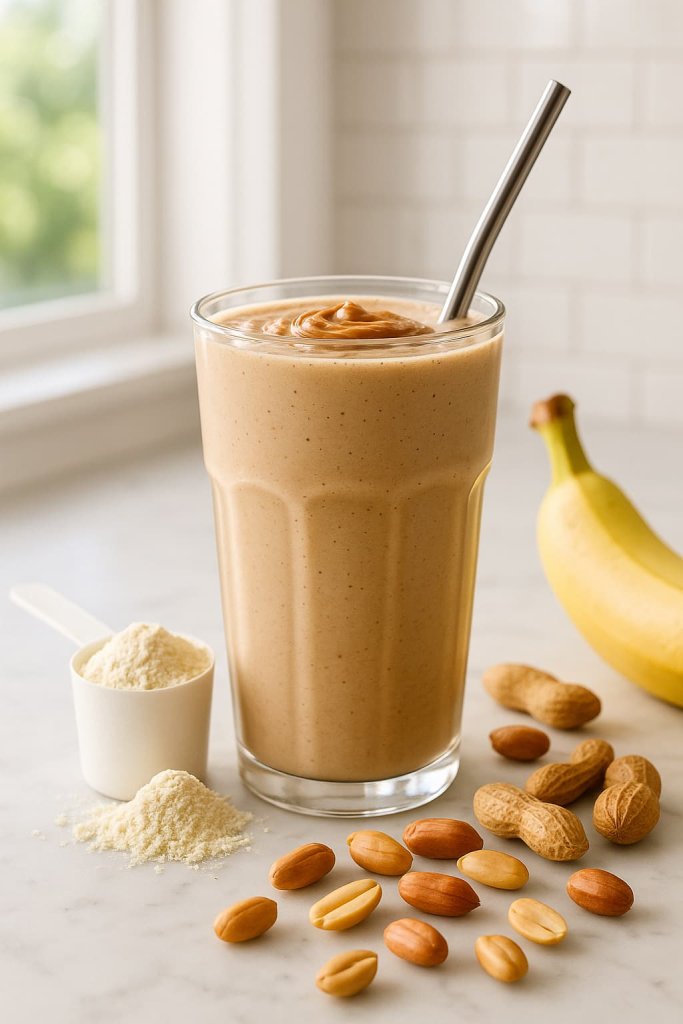
Each two-tablespoon serving of peanut butter provides about 8 grams of protein, making it an excellent source of plant-based nutrition for muscle repair and growth. Protein helps rebuild tissues after exercise, supports enzyme production, and contributes to energy metabolism.
When paired with whole-grain bread, apples, or bananas, peanut butter creates a complete amino acid profile, similar to that of animal protein sources. The U.S. Department of Agriculture (USDA) emphasizes that peanut butter’s high protein and nutrient density make it an affordable, plant-forward food option for balanced diets.
3. May Help With Weight Management

Despite being calorie-dense, peanut butter may help with appetite regulation and healthy weight management when eaten in moderation. Its balanced mix of healthy fats, protein, and dietary fiber promotes satiety, helping you feel fuller for longer and reducing unnecessary snacking between meals.
A 2022 systematic review and meta-analysis published in Nutrients and available on the National Library of Medicine (PMC) found that regular nut consumption, including peanuts, was not associated with weight gain, higher BMI, or waist circumference. Instead, higher nut intake was linked to a lower risk of overweight and obesity in long-term cohort studies.
Additionally, research summarized by Nuts for Life — an evidence-based Australian organization supported by health professionals — reports that nuts can play a beneficial role in weight control by improving satiety, metabolism, and nutrient density of the diet.
Including small portions of peanut butter — about 1 to 2 tablespoons (16–32 g) per day — as part of a balanced diet may therefore support long-term weight maintenance when combined with physical activity and portion awareness.
(Sources: National Library of Medicine, 2022; Nuts for Life, 2023)
4. Rich in Antioxidants and Polyphenols
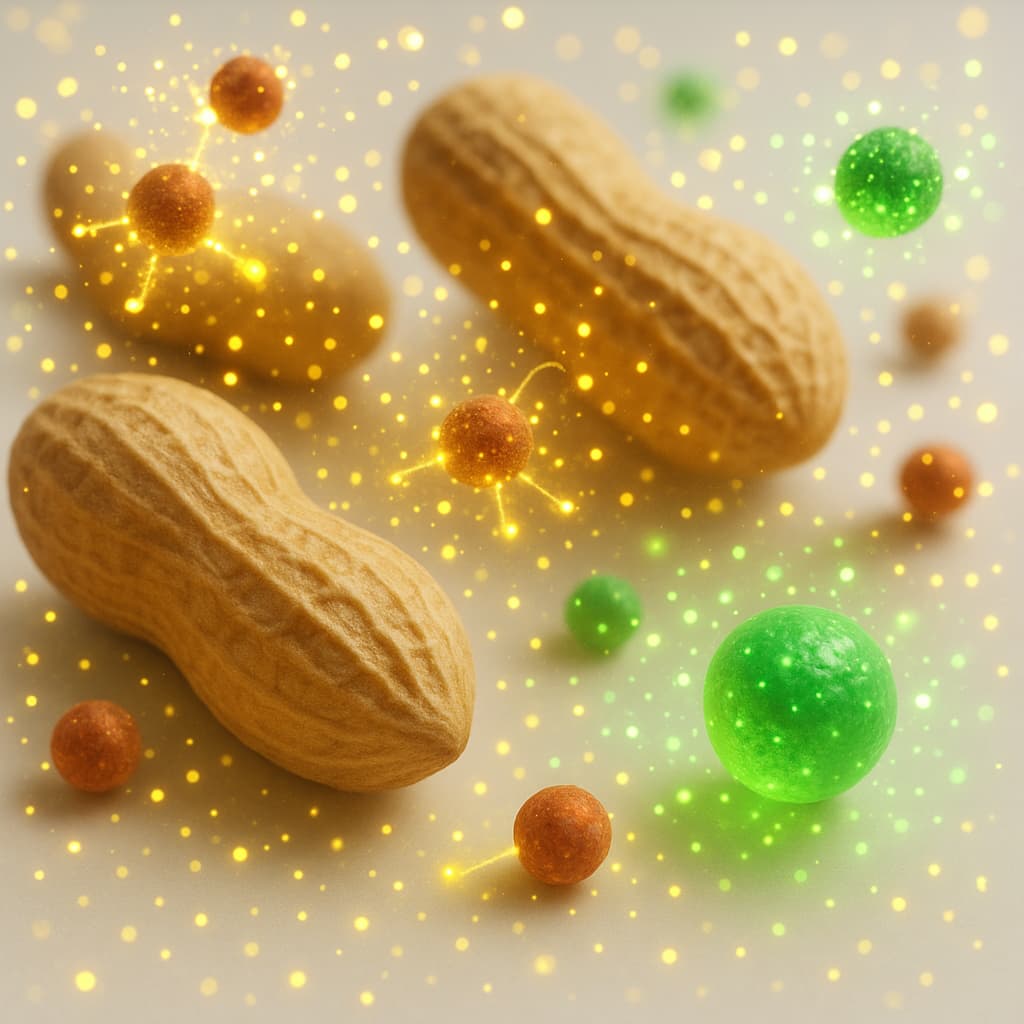
Natural peanut butter contains resveratrol, p-coumaric acid, and vitamin E — potent antioxidants that help combat oxidative stress and support cellular health. These compounds may contribute to reduced inflammation and better vascular function.
A 2024 study from the University of Barcelona found that moderate peanut consumption enhanced antioxidant defense mechanisms and improved endothelial (blood vessel) health in healthy young adults, highlighting peanut butter’s potential in promoting cardiovascular resilience.
5. Supports Muscle and Bone Strength
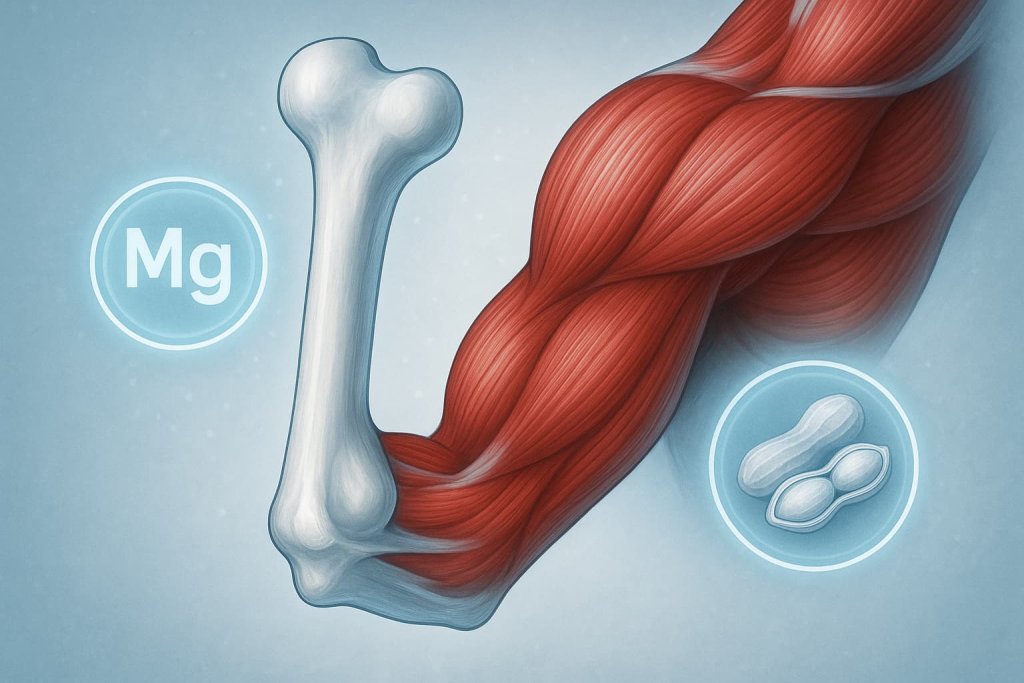
Peanut butter is naturally rich in magnesium, phosphorus, and protein, nutrients essential for strong bones and healthy muscles.
- Magnesium supports energy production and muscle recovery.
- Phosphorus helps maintain bone density and cellular function.
- Protein provides the building blocks for tissue repair and growth.
According to the National Institutes of Health (NIH) Office of Dietary Supplements, magnesium and phosphorus are critical minerals that contribute to structural bone integrity and neuromuscular health. Including peanut butter as part of a nutrient-rich diet may therefore support active lifestyles.
6. Helps Maintain Blood Sugar Balance
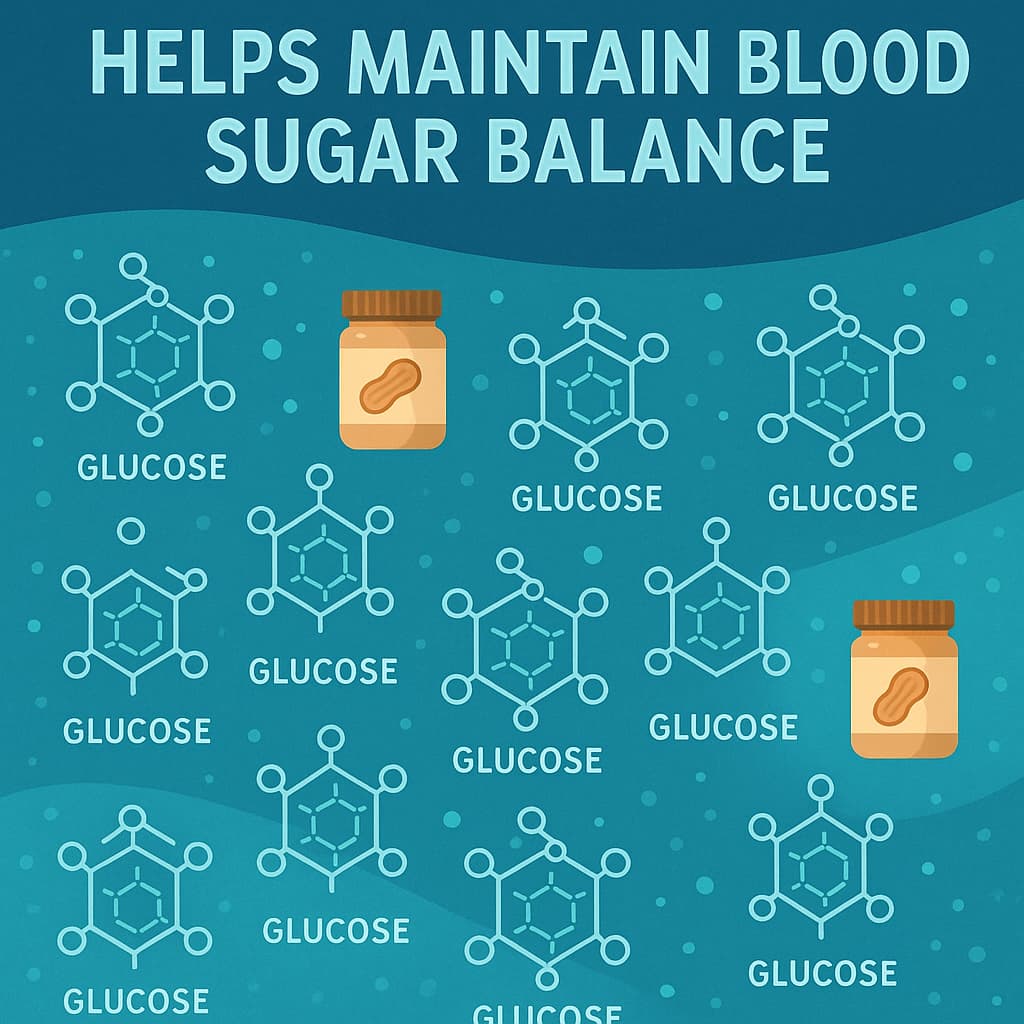
The healthy fats, fiber, and protein in peanut butter may help slow glucose absorption, resulting in steadier blood sugar levels and lower post-meal spikes. This makes it a smart food choice for people aiming to manage energy or blood sugar balance.
Research published in Nutrients (2022) found that consuming peanuts or peanut butter alongside carbohydrate-rich foods reduced postprandial blood glucose levels, supporting glycemic control. The American Diabetes Association also recommends nut butters as part of balanced snacks due to their low glycemic load when unsweetened and portion-controlled.
7. Promotes Brain and Nerve Function
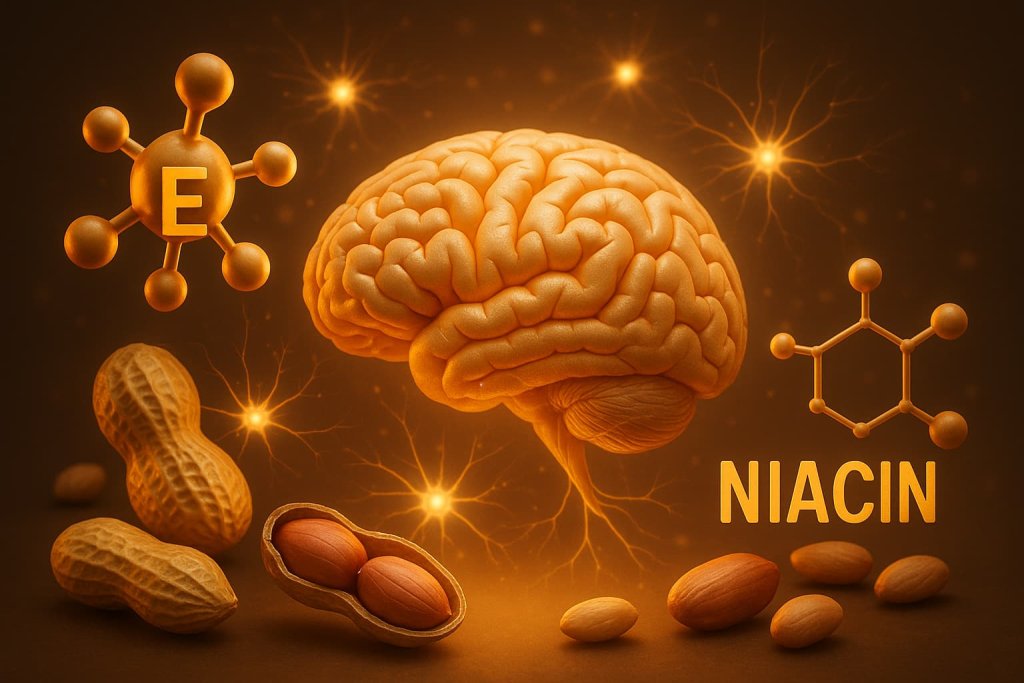
Peanut butter provides niacin (vitamin B3) and vitamin E, both essential for brain and nerve function.
- Niacin supports neurotransmitter synthesis and may help maintain memory and cognitive performance.
- Vitamin E acts as an antioxidant that protects brain cells from oxidative stress.
Studies referenced by the National Library of Medicine suggest that diets rich in vitamin E and B vitamins may help support long-term brain health and reduce age-related cognitive decline.
8. Supports Gut and Digestive Wellness
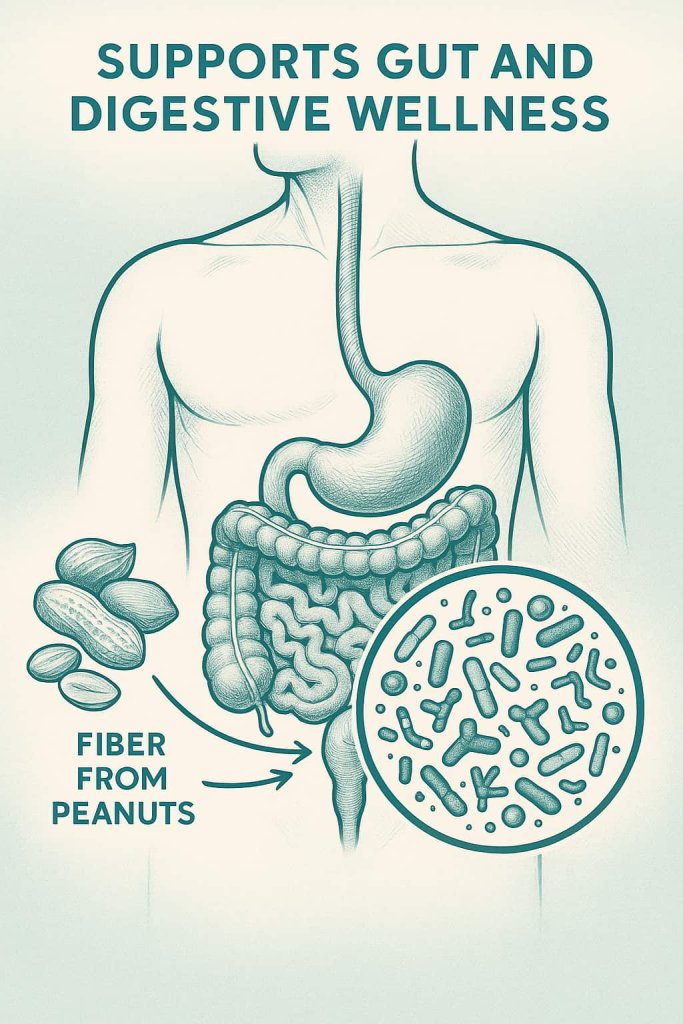
With around 3 grams of dietary fiber per serving, peanut butter contributes to digestive regularity and gut microbiome balance. Fiber nourishes beneficial gut bacteria, which play a crucial role in nutrient absorption and immune support.
According to the Cleveland Clinic, including fiber-rich foods such as peanuts and peanut butter can enhance gut health and support long-term digestive wellness when consumed with fruits, vegetables, and whole grains.
9. May Boost Energy and Endurance

The mix of protein, healthy fats, and natural calories in peanut butter provides sustained energy throughout the day. It’s a favorite among athletes because it helps replenish glycogen and maintain endurance during workouts.
The American College of Sports Medicine notes that combining carbohydrates with healthy fats and proteins before or after exercise may improve recovery and energy levels. Peanut butter on whole-grain toast or blended into a smoothie offers a convenient, balanced fuel option.
10. Provides Essential Micronutrients
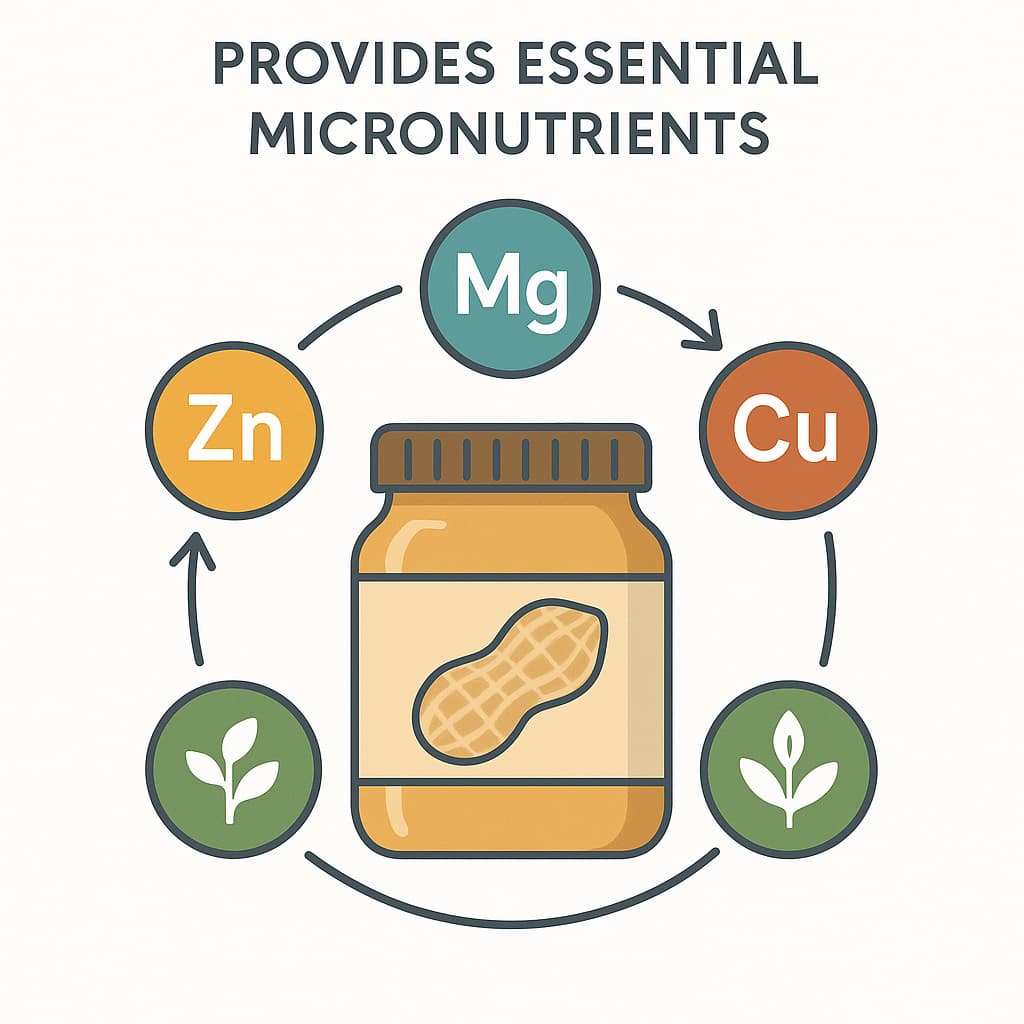
Peanut butter supplies essential micronutrients such as copper, manganese, folate, zinc, and potassium, all of which support various body functions:
- Copper & Zinc: aid immune defense and collagen formation.
- Folate: supports DNA synthesis and cell repair.
- Manganese: contributes to antioxidant enzyme activity.
According to the National Institutes of Health (NIH), these micronutrients help maintain energy metabolism, immune response, and cellular protection — making peanut butter a compact, nutrient-dense addition to a balanced diet.
How to Eat Peanut Butter for Maximum Benefits
Moderation and quality are key when adding peanut butter to your diet. For optimal wellness, the recommended serving size is 1–2 tablespoons (16–32 g) per day as part of a balanced meal plan. This portion provides sufficient protein, healthy fats, and essential nutrients without adding unnecessary calories.
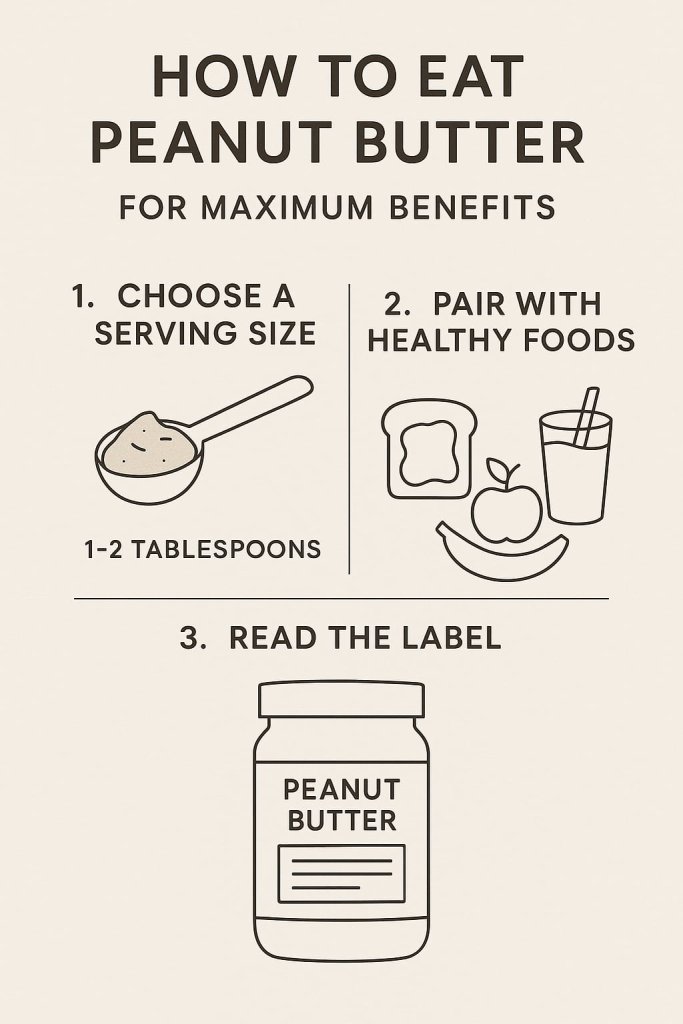
Best Ways to Enjoy Peanut Butter
- On Whole-Grain Toast: Spread peanut butter on warm toast and top with banana slices, chia seeds, or a drizzle of honey for a fiber- and potassium-rich breakfast that supports sustained energy.
- With Fruit or Vegetables: Pair with apple slices, celery sticks, or pear wedges for a balanced snack that combines protein, fiber, and natural sweetness.
- In Smoothies: Blend 1 tablespoon with milk (or a plant-based alternative), oats, and berries for a satisfying, protein-rich smoothie that promotes post-workout recovery.
- In Oatmeal or Yogurt: Stir into hot oatmeal or Greek yogurt to add creaminess and healthy fats that support muscle and heart health.
- With Protein Sources: Combine with whole-grain crackers, boiled eggs, or lentils to enhance your amino acid profile and promote fullness.
According to the American Heart Association (AHA), unsweetened, low-sodium peanut butter is a heart-healthy source of plant-based protein and unsaturated fats when consumed in moderation. The AHA emphasizes portion control — nuts and nut butters are nutrient-rich but calorie-dense, so small servings are best.
Additionally, the Harvard T.H. Chan School of Public Health highlights that natural peanut butter fits well into a Mediterranean-style eating pattern, which emphasizes whole foods like fruits, vegetables, legumes, and healthy fats. Research suggests this dietary approach supports cardiovascular health and overall longevity.
Always read ingredient labels carefully — the healthiest peanut butters contain only peanuts (and salt, if desired) without added sugar, hydrogenated oils, or palm oil. Choosing natural or organic brands helps maximize nutritional quality while minimizing additives that can undermine heart health.
In summary, enjoying small, mindful servings of peanut butter — especially natural varieties — can be an easy, delicious way to boost protein intake, satiety, and heart health as part of a balanced, Mediterranean-inspired diet.
Possible Side Effects and Precautions
While peanut butter offers numerous health benefits, it should be consumed mindfully and safely, especially for individuals with allergies or specific health conditions.
1. Peanut Allergies
Peanut allergy is one of the most common and potentially severe food allergies. Even small traces can cause allergic reactions such as hives, swelling, or breathing difficulty. Individuals with known allergies should avoid peanut butter completely and seek advice from a certified allergist.
2. Calorie Density
Peanut butter is calorie-rich (around 190 kcal per 2 tablespoons). Overconsumption can contribute to excessive calorie intake and potential weight gain. Practice portion control by measuring servings instead of eating directly from the jar.
3. Aflatoxin Contamination
Peanuts can naturally harbor Aspergillus fungi, which produce aflatoxins, harmful compounds regulated by the U.S. Food and Drug Administration (FDA). Reputable brands test and monitor aflatoxin levels to ensure food safety. Always choose products from trusted manufacturers and store peanut butter in cool, dry conditions to reduce mold risk.
4. Added Sugars and Sodium
Many commercial peanut butters contain added sugars, hydrogenated oils, or excess salt, which may affect heart health and blood pressure. Opt for natural or organic peanut butter with minimal ingredients for maximum nutritional value.
5. Pregnancy and Children
Peanut butter can be a safe and nutritious food choice during pregnancy and early childhood — when introduced carefully and under proper medical guidance. It provides essential nutrients like protein, folate, magnesium, and healthy fats that support maternal nutrition, fetal development, and early growth.
During Pregnancy
For individuals without a peanut allergy, eating peanut butter in moderation during pregnancy may support overall maternal health. It offers folate, which plays a vital role in early neural tube development, and healthy monounsaturated fats, which contribute to fetal brain growth. According to the American College of Obstetricians and Gynecologists (ACOG), consuming a variety of nutrient-dense foods — including legumes and nuts — supports a balanced prenatal diet.
(Source: ACOG – Nutrition During Pregnancy)
However, pregnant individuals with a known peanut allergy should strictly avoid peanut products and consult their healthcare provider for personalized nutrition advice.
Introducing Peanuts to Infants
Recent clinical evidence shows that introducing peanut-containing foods early in infancy — around 4 to 6 months of age, once the baby is developmentally ready — may help reduce the risk of developing peanut allergies. The American Academy of Pediatrics (AAP) and the National Institute of Allergy and Infectious Diseases (NIAID) recommend early introduction under medical supervision, especially for infants with severe eczema or egg allergy, who are at higher risk of peanut allergy.
(Sources: AAP – HealthyChildren.org: When to Introduce Peanut Butter and Other Common Food Allergens
Safe Introduction Tips for Infants
- Ensure your baby is developmentally ready for solid foods (able to sit upright, shows interest in food).
- Use age-appropriate peanut forms — such as thinned peanut butter mixed with breast milk, formula, or water — rather than whole nuts, which pose choking hazards.
- Offer a small amount (about 2 teaspoons diluted) initially, and observe for any allergic reactions.
- Continue offering peanut-containing foods regularly (a few times per week) once tolerated.
In summary, moderate peanut butter consumption during pregnancy may support nutrient needs, and early, supervised introduction of peanuts in infancy may help lower allergy risk. Always consult a pediatrician or allergist before introducing potential allergens, particularly if there’s a family history of severe allergies.
(References: ACOG, AAP, NIAID, 2024)
Recommended Storage and Food Safety
Proper storage ensures both nutrient preservation and product safety. The U.S. Food and Drug Administration (FDA) provides clear guidelines for safe handling and storage of nut-based foods.
Storage Tips:
- Unopened Jars: Store in a cool, dry place away from direct sunlight.
- Opened Jars: Refrigerate natural peanut butter after opening to prevent oil separation and rancidity. Stir well before refrigeration to maintain texture.
- Shelf Life: Typically lasts 2–3 months after opening (refrigerated).
- Hygiene: Always use a clean, dry spoon to prevent bacterial contamination.
- Freezing Option: For longer preservation, freeze portions in airtight containers; thaw in the refrigerator before use.
Following these FDA-recommended safety practices ensures your peanut butter stays fresh, flavorful, and free from microbial risks.
Frequently Asked Questions (FAQ)
Q1. Is peanut butter good for heart health?
Yes. When consumed in moderation, its unsaturated fats may support cardiovascular health by maintaining balanced cholesterol levels.
Q2. Can people with diabetes eat peanut butter?
Yes. Natural peanut butter (unsweetened) has a low glycemic index and may help stabilize blood sugar when eaten with fiber-rich foods.
Q3. How much peanut butter should I eat per day?
Most adults can safely enjoy 1–2 tablespoons (16–32 g) daily as part of a balanced diet.
Q4. Is peanut butter safe during pregnancy?
Yes, it provides protein, folate, and healthy fats beneficial for fetal growth — unless there’s a known allergy.
Q5. Can children eat peanut butter safely?
Yes, under pediatric guidance. Early, careful introduction may help reduce allergy risk according to the AAP.
Q6. What’s the healthiest type of peanut butter?
Choose natural or organic peanut butter made from 100% peanuts (and optional salt) without added oils or sugars.
Q7. Can peanut butter go bad?
Yes. Signs of spoilage include an off odor, bitter taste, or mold growth. Always check the expiration date and store it properly.
Conclusion
Peanut butter is a nutrient-rich, versatile food that can support heart health, weight control, muscle strength, and overall wellness when consumed in moderation. Its combination of protein, healthy fats, and essential vitamins makes it a smart addition to balanced diets — provided you choose natural varieties and maintain portion awareness.
Enjoy peanut butter alongside whole grains, fruits, and vegetables for maximum nutritional benefit.
This content is for informational purposes only and not medical advice.
References:
- U.S. Department of Agriculture – FoodData Central (2024)
- American Heart Association – Go Nuts (But Just a Little!)
- Harvard T.H. Chan School of Public Health – Peanuts and Peanut Butter Can Be Healthy
- Advances in Nutrition – Intake of Nuts or Nut Products Does Not Lead to Weight Gain (Systematic Review & Meta-Analysis, 2020)
- University of Barcelona – Peanuts Improve Vascular and Antioxidant Health in Healthy Adults (2023)
